新概念第一册重点及重要句型109-120
新概念1-144课语法和重点总结
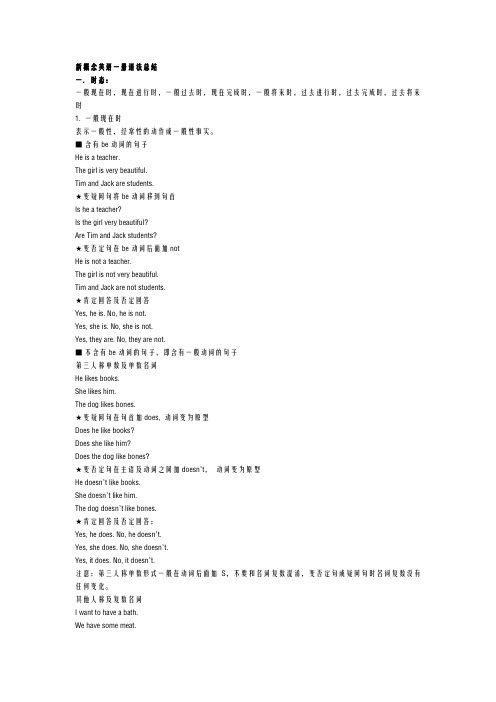
新概念英语一册语法总结一.时态:一般现在时,现在进行时,一般过去时,现在完成时,一般将来时,过去进行时,过去完成时,过去将来时1. 一般现在时表示一般性,经常性的动作或一般性事实。
■含有be动词的句子He is a teacher.The girl is very beautiful.Tim and Jack are students.★变疑问句将be动词移到句首Is he a teacher?Is the girl very beautiful?Are Tim and Jack students?★变否定句在be动词后面加notHe is not a teacher.The girl is not very beautiful.Tim and Jack are not students.★肯定回答及否定回答Yes, he is. No, he is not.Yes, she is. No, she is not.Yes, they are. No, they are not.■不含有be动词的句子,即含有一般动词的句子第三人称单数及单数名词He likes books.She likes him.The dog likes bones.★变疑问句在句首加does, 动词变为原型Does he like books?Does she like him?Does the dog like bones?★变否定句在主语及动词之间加doesn’t,动词变为原型He doesn’t like books.She doesn’t like him.The dog doesn’t like bones.★肯定回答及否定回答:Yes, he does. No, he doesn’t.Yes, she does. No, she doesn’t.Yes, it does. No, it doesn’t.注意:第三人称单数形式一般在动词后面加S,不要和名词复数混淆,变否定句或疑问句时名词复数没有任何变化。
新概念英语第一册所有语法点汇总)
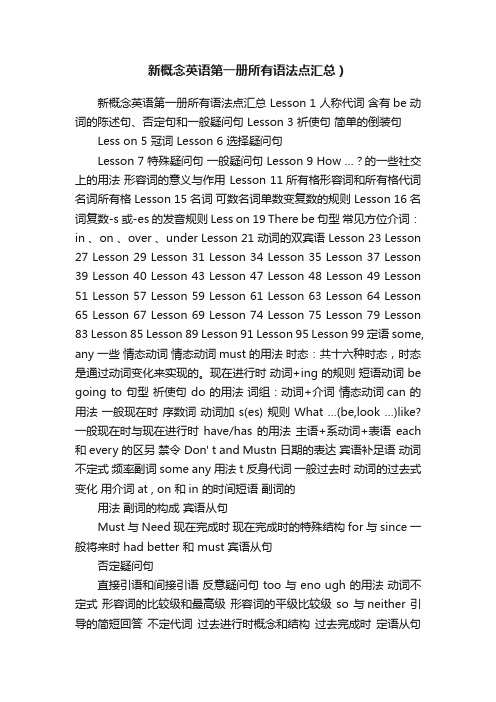
新概念英语第一册所有语法点汇总)新概念英语第一册所有语法点汇总 Lesson 1 人称代词含有be 动词的陈述句、否定句和一般疑问句 Lesson 3 祈使句简单的倒装句Less on 5 冠词 Lesson 6 选择疑问句Lesson 7 特殊疑问句一般疑问句Lesson 9 How …?的一些社交上的用法形容词的意义与作用 Lesson 11所有格形容词和所有格代词名词所有格 Lesson 15 名词可数名词单数变复数的规则 Lesson 16 名词复数-s 或-es 的发音规则 Less on 19 There be 句型常见方位介词:in 、on 、over 、under Lesson 21 动词的双宾语 Lesson 23 Lesson 27 Lesson 29 Lesson 31 Lesson 34 Lesson 35 Lesson 37 Lesson 39 Lesson 40 Lesson 43 Lesson 47 Lesson 48 Lesson 49 Lesson 51 Lesson 57 Lesson 59 Lesson 61 Lesson 63 Lesson 64 Lesson 65 Lesson 67 Lesson 69 Lesson 74 Lesson 75 Lesson 79 Lesson 83 Lesson 85 Lesson 89 Lesson 91 Lesson 95 Lesson 99 定语 some, any 一些情态动词情态动词must 的用法时态:共十六种时态,时态是通过动词变化来实现的。
现在进行时动词+ing 的规则短语动词 be going to 句型祈使句 do 的用法词组:动词+介词情态动词can 的用法一般现在时序数词动词加 s(es) 规则What …(be,look …)like? 一般现在时与现在进行时have/has 的用法主语+系动词+表语each 和every 的区另禁令 Don' t and Mustn 日期的表达宾语补足语动词不定式频率副词 some any 用法 t 反身代词一般过去时动词的过去式变化用介词at , on 和in 的时间短语副词的用法副词的构成宾语从句Must 与 Need 现在完成时现在完成时的特殊结构 for 与 since 一般将来时 had better 和 must 宾语从句否定疑问句直接引语和间接引语反意疑问句 too 与 eno ugh 的用法动词不定式形容词的比较级和最高级形容词的平级比较级 so 与neither 引导的简短回答不定代词过去进行时概念和结构过去完成时定语从句感叹句 must, have to 和 needn' t 表示猜测和推断的情态助动词 must 和can ' t 情态助动词may 表示可能性需改变时态的间接陈述句 Let 的用法条件从句被动语态新概念英语第一册语法点归纳大纲新概念英语第一册语法点归纳新概念一共144课,其中单课为课文,双课为语法和练习。
新概念英语第一册教学重点

新概念英语第一册教学重点Lesson One1)一般疑问句:由BE 动词开头,并用YES 或NO 回答的问句。
EG:Is this your handbag ? Yes ,it is . No, it isn’t.2) BE 动词简单的讲一下Be ( am is are )I am , he she it (is ) you we they ( are )用student 举例:I am a student . He ( she ) is a student .Lesson Three1)复习一般疑问句及回答。
2)教授句型:here’s (倒装句)Eg: Here is my ticket .Here is your umbrella and your coat..3)重点掌握:否定句:(BE 动词后加NOT 组成。
含有“不”的意思的句子。
是陈述句的一种。
Eg: This is not my umbrella .Lesson five1)复习BE动词的用法:2)重点句型:介绍别人时:This is ….. and This is ….3)教授国籍(大点的学生教授国家和国籍。
)这里第一次输入国籍的询问方式(whatnationality ……)4)提一下:a / anLesson seven1)复习BE 动词,教授BE 动词的缩写形式。
Eg :I am = I’m2)重点教授特殊疑问句:What’s ….job3)重点掌握各种职业。
4)重点掌握问国籍的问法。
(多出一些就画线部分提问的题目)5)a/an 本课过关。
Lesson nine1)复习BE 动词。
2)重点讲述HOW 的疑问句,区别how are you ? How is ….3)适当扩展回答:fine , very well soso, pretty good .4)进反义词的比较。
(可出一些填空比较题。
)Lesson eleven1)复习BE 动词2)Whose 的特殊疑问句。
新概念英语第一册阶段测试题(L109--120)

新概念英语第一册阶段测试题(L109--120)新概念英语第一册阶段测试题(L109--120)新概念第一册阶段测试题(Lesson 109- Lesson 120)Name____________一、根据句子的含义填入正确的单词,单词的第一个字母已给出(10%)。
1. Don’t spend money like that. You are not a m__________.2. The price is too high and nobody here can’t a_______ it.3. “Fares, please!” said the c___________.4. Every p_________ must buy a ticket.5. I heard someone k_______ at the door.6. I did not wear my g________ and could not see it clearly.7. He has drunk too much water and now he wants to go the t_________.8. Don’t let the baby put small things into his m________. It is dangerous.9. Two t_______ stole my car.10. I have a p_______ and the bird can speak Chinese.二、选词填空(20%)。
()1. I _______ my glasses everywhere.A. looked forB. looked atC. looked outD. found()2. When we ________ supper, Tom came in.A. are havingB. hadC. were havingD. have()3. ______ of us are from China.A. BothB. The bothC. OneD. Both two()4. Someone knocked ____ the door while I ____ my breakfast.A. on, hadB. at, were havingC. on, am havingD. at, was having()5. The parrot heard some noise and asked, ‘What’s ______? ‘A. downB. upC. underD. behind()6. It is ____ good _____ the expensive one.A. so, asB. not so, asC. as, not asD. not as, so()7. Buying ____ instalments makes many things possible.A. /B. inC. atD. with()8. This model is _______ than that one.A. much expensiveB. much more expensiveC. much expensiveD. more expensive()9. A: I haven’t got any small change.B: __________.A. So do I.B. So have I.C. Neither I haveD. Neither have I ()10. Everybody _______ to have lunch in the garden.A. wantB. wantsC. were wantedD. wanting三、填入句中所缺的词(10%)。
新概念英语第一册Lesson109~114语法及单词解析
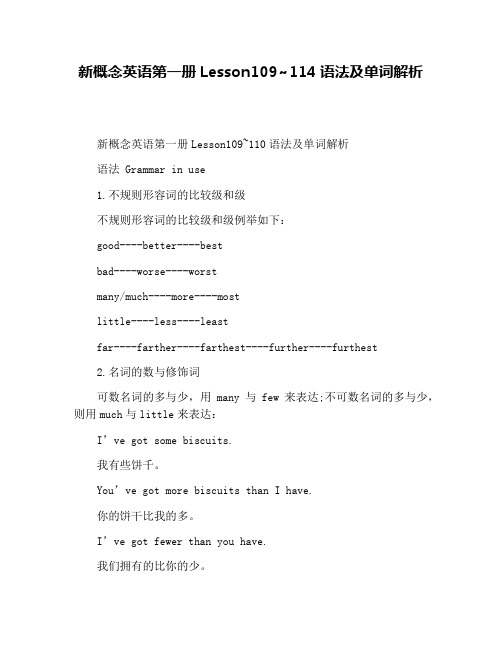
新概念英语第一册Lesson109~114语法及单词解析新概念英语第一册Lesson109~110语法及单词解析语法 Grammar in use1.不规则形容词的比较级和级不规则形容词的比较级和级例举如下:good----better----bestbad----worse----worstmany/much----more----mostlittle----less----leastfar----farther----farthest----further----furthest2.名词的数与修饰词可数名词的多与少,用many与few来表达;不可数名词的多与少,则用much与little来表达:I’ve got some biscuits.我有些饼千。
You’ve got more biscuits than I have.你的饼干比我的多。
I’ve got fewer than you have.我们拥有的比你的少。
I’ve got very few.我有为数很少的(几块)。
I’ve got some chocolate.我有些巧克力。
You’ve got more chocolate than I have.你的巧克力比我的多。
I’ve got less than you have.我所拥有的比你所拥有的少。
I’ve got very little.我所有的为数很少。
词汇学习 Word study1.smoke v.(1)抽(纸烟、烟斗等):He smokes cigars.他抽雪茄。
Eat more and smoke less!多吃点,少抽点!(2)冒烟;冒雾气:She could see a chimney smoking in the nearby village.她能够看到附近村子里的烟囱在冒烟。
Is the fireplace smoking?壁炉在冒烟吗?(3)熏制(鱼肉等):Do you know how to smoke hams?你知道如何熏制火腿吗?2.instead adv.(1)作为替代:I'm tired and can't attend the meeting; you could go instead.我累了,不能去开会了,你能够代替我去。
新概念课堂笔记第一册Lesson109-110

新概念课堂笔记第一册Lesson109-110 Word Studyidea【用法】n. 主意;方法;观念【词组】a good idea 好主意have no idea 不明白【例句】It’s hard to change a person’s idea. 专门难改变一个人的观念。
a little【用法】少许(修饰或替代不可数名词);小【辨析】a little 和little○1 a little 表示确信含义。
比如:There is a little milk in the bottle. 瓶子里还有一点牛奶。
○2little 表示否定含义。
比如:There is little bread in the fri dge. 冰箱里一点面包都没有了。
【扩展】a little, a bit, a litt le bit “略微,有点”这三个短语都可修饰形容词,比如:The dress is a little (a bit)long. 这裙子有点长。
The problem is a littl e bit difficult. 那个问题略微有点难。
a little boy 一个小男孩儿(含可爱之意)其比较等级为:little —less —leasta few【用法】几个(修饰或替代可数名词)【辨析】a few 和few○1 a few 表示确信含义。
比如:There are a few apples in the box. 盒子里还有几个苹果。
○2few 表示否定含义。
比如:There are few ap ples in the box, so I have to buy some in the afternoon. 在箱子里几乎没有苹果了,因此我下午必须去买一些。
【扩展】比较等级:few —fe wer —fewestless【用法】adj. 较少的,更小的(little的比较级)【词组】less than 少于no less than 多达,与……一样,许多于pity【用法】n. 遗憾【词组】take a pity on 同情【扩展】pitiful adj. 悲伤的,可鄙的instead【用法】adv. 代替【词组】instead of 代替,而不是……【辨析】instead 和instead of○1instead 位于句首或句尾,是副词。
最新新概念英语第一册L109-110

Shall we go to the park? some 一般用于肯定句,但如果是征求某人意见,或 期望得到对方的肯定回答时,可用于疑问句。 idea [C] 我有一个好主意。
I have a good idea.
夏洛特:咖啡好了,你要放点奶吗? CHARLOTTE:It‘s ready. Do you want any milk? 简:请稍加一点。 JANE:Just a little, please.
instead adv. 代替
① adv. 作为替代 I’m tired and can’t attend the meeting;
you could go instead. She did not want to go to the university.
Instead, she decided to become a singer. ② adv. 代替,而不是(of) She wanted to have milk instead of juice. She prefers buying books instead of
borrowing them from the library. 她宁可买书而不愿到图书馆去借。
advice n. 建议,忠告(不可数名 词);v. 建议
a piece of advice 一条建议 take one’s advice 听从某人的建议 You'd better take my advice next time. follow one's advice 采纳某人的建议 advise sb. to do sth. 建议某人做某事 I advice you to stop smoking.
新概念英语第一册Lesson99~104重点内容
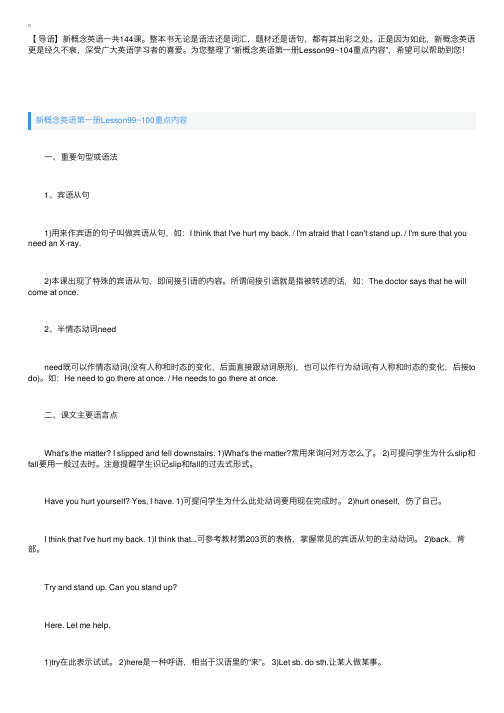
【导语】新概念英语⼀共144课。
整本书⽆论是语法还是词汇,题材还是语句,都有其出彩之处。
正是因为如此,新概念英语更是经久不衰,深受⼴⼤英语学习者的喜爱。
为您整理了“新概念英语第⼀册Lesson99~104重点内容”,希望可以帮助到您!新概念英语第⼀册Lesson99~100重点内容 ⼀、重要句型或语法 1、宾语从句 1)⽤来作宾语的句⼦叫做宾语从句,如:I think that I've hurt my back. / I'm afraid that I can't stand up. / I'm sure that you need an X-ray. 2)本课出现了特殊的宾语从句,即间接引语的内容。
所谓间接引语就是指被转述的话,如:The doctor says that he will come at once. 2、半情态动词need need既可以作情态动词(没有⼈称和时态的变化,后⾯直接跟动词原形),也可以作⾏为动词(有⼈称和时态的变化,后接to do)。
如:He need to go there at once. / He needs to go there at once. ⼆、课⽂主要语⾔点 What's the matter? I slipped and fell downstairs. 1)What's the matter?常⽤来询问对⽅怎么了。
2)可提问学⽣为什么slip和fall要⽤⼀般过去时。
注意提醒学⽣识记slip和fall的过去式形式。
Have you hurt yourself? Yes, I have. 1)可提问学⽣为什么此处动词要⽤现在完成时。
2)hurt oneself,伤了⾃⼰。
I think that I've hurt my back. 1)I think that...可参考教材第203页的表格,掌握常见的宾语从句的主动动词。
新概念1-144课语法和重点总结

新概念英语一册语法总结一.时态:一般现在时,现在进行时,一般过去时,现在完成时,一般将来时,过去进行时,过去完成时,过去将来时1. 一般现在时表示一般性,经常性的动作或一般性事实。
■含有be动词的句子He is a teacher.The girl is very beautiful.Tim and Jack are students.★变疑问句将be动词移到句首Is he a teacher?Is the girl very beautiful?Are Tim and Jack students?★变否定句在be动词后面加notHe is not a teacher.The girl is not very beautiful.Tim and Jack are not students.★肯定回答及否定回答Yes, he is. No, he is not.Yes, she is. No, she is not.Yes, they are. No, they are not.■不含有be动词的句子,即含有一般动词的句子第三人称单数及单数名词He likes books.She likes him.The dog likes bones.★变疑问句在句首加does, 动词变为原型Does he like books?Does she like him?Does the dog like bones?★变否定句在主语及动词之间加doesn’t,动词变为原型He doesn’t like books.She doesn’t like him.The dog doesn’t like bones.★肯定回答及否定回答:Yes, he does. No, he doesn’t.Yes, she does. No, she doesn’t.Yes, it does. No, it doesn’t.注意:第三人称单数形式一般在动词后面加S,不要和名词复数混淆,变否定句或疑问句时名词复数没有任何变化。
新概念英语第一册重点词汇和语法(完整版)
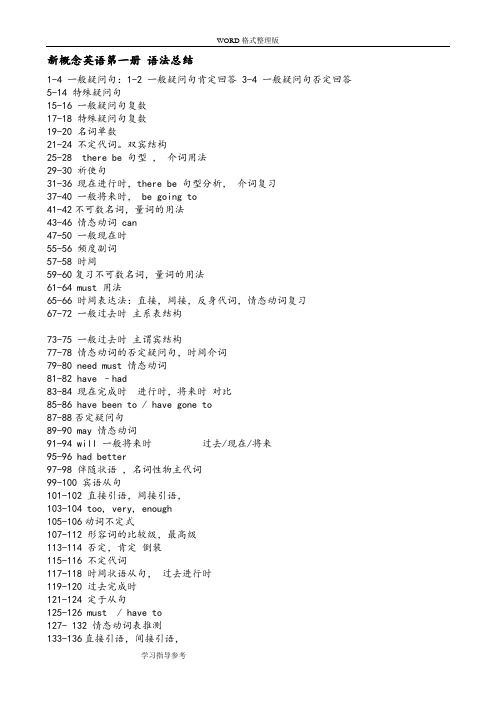
新概念英语第一册语法总结1-4 一般疑问句:1-2 一般疑问句肯定回答 3-4 一般疑问句否定回答5-14 特殊疑问句15-16 一般疑问句复数17-18 特殊疑问句复数19-20 名词单数21-24 不定代词。
双宾结构25-28 there be 句型,介词用法29-30 祈使句31-36 现在进行时,there be 句型分析,介词复习37-40 一般将来时, be going to41-42不可数名词,量词的用法43-46 情态动词 can47-50 一般现在时55-56 频度副词57-58 时间59-60复习不可数名词,量词的用法61-64 must 用法65-66 时间表达法:直接,间接,反身代词,情态动词复习67-72 一般过去时主系表结构73-75 一般过去时主谓宾结构77-78 情态动词的否定疑问句,时间介词79-80 need must 情态动词81-82 have –had83-84 现在完成时进行时,将来时对比85-86 have been to / have gone to87-88否定疑问句89-90 may 情态动词91-94 will 一般将来时过去/现在/将来95-96 had better97-98 伴随状语,名词性物主代词99-100 宾语从句101-102 直接引语,间接引语,103-104 too, very, enough105-106动词不定式107-112 形容词的比较级,最高级113-114 否定,肯定倒装115-116 不定代词117-118 时间状语从句,过去进行时119-120 过去完成时121-124 定于从句125-126 must / have to127- 132 情态动词表推测133-136直接引语,间接引语,137-138 条件状语从句139-140宾语从句141-144 被动语态Lesson 1 Excuse me1. Words1) excuse (1)重音(2)与sorry 的区别(3)Excuse 用的不同场景a. 请别人让路b. 引起别人的注意c. 打断别人的谈话d. 可以当n. 借口 eg. No excuse. 别找借口,没有借口。
2020最新新概念英语第一册Lesson109~114语法及单词解析
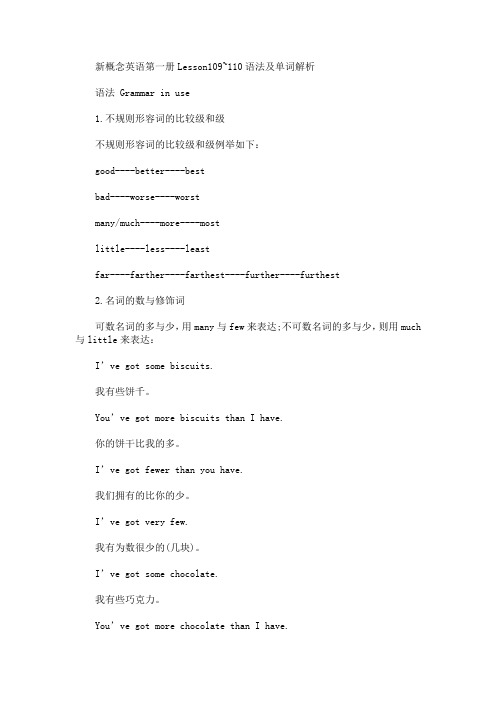
You'll have to pay a deposit of $ 60 to reserve the room
要预定存储:
We were advised to deposit our valuables in the bank safe
你知道如何熏制火腿吗?
2.instead adv.
(1)作为替代:
I'm tired and can't attend the meeting; you could go instead.
我累了,不能去开会了,你可以代替我去。
She did not want to go to the university. Instead, she decided to become a singer.
I feel I can' t afford any more time on this project.
我觉得我不能再在这个项目上花更多的时间。
We can't afford such enormous fees.
我们无法负担如此巨额的费用。
2.deposit
(1)n.预付定金;押金;保证金:
He put down a deposit on the house yesterday.
I’ve got less than you have.
我所拥有的比你所拥有的少。
I’ve got very little.
我所有的为数很少。
词汇学习 Word study
1.smoke v.
(1)抽(纸烟、烟斗等):
He smokes cigars.
他抽雪茄。
Eat more and smoke less!
新概念英语第一册109-110课资料
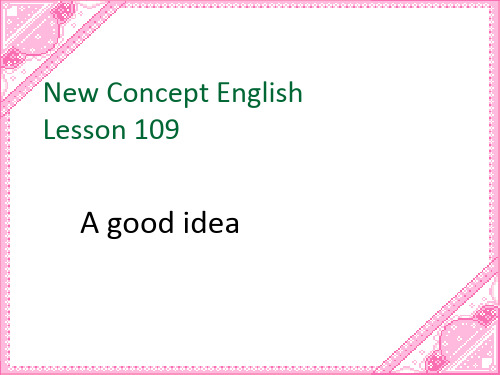
• a piece of advice 一个忠告
• advice on…
关于…的忠告
• 你能给我一些关于减肥的忠告吗?
• Can you give me some advice on losing weight?
Warm up
scare(吓) the shit out of someone 吓死某人了。
不要那样从后面和我说话。你吓死我了。 Don’t talk to me like that. You scared the shit out of me.
Warm up
fix someone up 撮合某人。
It’s a pity that he failed again. • 真可惜,实在可怜。
What a pity! • What a pity (that)…! ….的真是遗憾! • 她不能来真是遗憾。
What a pity (that) she cannot come! • 2) v. 令人觉得怜悯,同情 • 我因她的无助而觉得她可怜
• One and a half teaspoonfuls • 在英语中,一般比1大的东西,即使比2小,也
需要用复数形式。
• 我早上吃了一个半苹果当作早餐
• I ate one and a half apples as breakfast.
• That’s enough for me • be enough for sb 对某人来说…足够了 • 我有三只笔就足够了。
• There are a few students outside. • 他只有几个小时做这件事。
• He has only a few hours to do it.
• No, less than that. One and a half teaspoonfuls ,please.
新概念第一册重点句型

Lesson 1 Excuse me! 打扰了。
1.Excuse me!2.Yes?3.Is this your handbag?4.Pardon?5.Yes, it is./No, it isn't.6.Thank you very much.Lesson 3 Sorry, sir. 对不起,先生。
7.My coat and my umbrella please.8.Here is my ticket.9.This is not my umbrella.10.Sorry sir.Lesson 5 Nice to meet you 很高兴见到你。
11.Good morning.12.This is Miss Sophie Dupont.13.Sophie is a new student.14.She is French / German / Korean / Chinese / English / Italian / American.15.Nice to meet you.Lesson 7 Are you a teacher? 你是教师吗16.I am a new student.17.What's your name?18.My name's Robert.19.Are you French?20.Yes, I am. / No, I am not.21.What nationality are you?22.Are you a teacher?23.What's your job?24.I'm a keyboard operator.Lesson 9 How are you today? 今天好吗25.How are you today?26.I'm very well, thank you. And you?27.How is Tony?28.He's fine, thanks.29.Goodbye, Helen. Nice to see you.Lesson 11 Is this your shirt? 这是你的衬衫吗30.Whose shirt is that?31.My shirt's blue.32.Is this shirt Tim's?33.Perhaps it is, sir.34.Tim's shirt's white.35.Here you are. Catch!Lesson 13 A new dress 一件新连衣裙36.What colour's your new dress?37.It's green / yellow / orange / black / brown / red / purple / pink .e upstairs and see it.39.Look! Here it is!40.That's a nice dress.41.It's very smart.42.My hat's new, too.43.It's the same colour.Lesson 15 Your passports, please. 请出示你们的护照。
(完整版)新概念英语第1册109课词汇和知识点汇总

bad—---worse--—-worst
little—-——less———lest
many---more———most
109课语法
1.some 和any 区别
some:肯定句
any :疑问句,否定句
I want some milk.
I don’t want any milk.
a few 几个
few几乎没有
alittle少许,一点儿
little几乎没有
Therearea few studentsin the classroom.
There arefew studentsin the classroom.
There isa little waterin the bottle。
It’s a good idea for me tolearn drawing pictures.对我来说画画是个好主意。
2.berthe examination。
3.less较少的,更少的
little的比较级:little—-—-less———the least
Everyone should give mea piece of advice.每人应该给我一条建议。
Ishouldtake your advice.我应该采取你的建议。
6.instead代替
instead of 代替
If you cannot go, he will goinstead ofyou.如果你不能去,他替你去.
There islittle waterin the bottle。
5.enough:足够两面派,见到名词跑在前,见到形容词跑在后
新概念英语第一册考评试卷含答案(第109-120课)

新概念英语第一册109-120考试注意事项:本次考试满分为100分,考试时间为50分钟。
本试卷旨在考察学生对课本知识的掌握,考试成绩只作为英语成绩衡量的参考。
考试范围:新概念英语第一册Lesson109-120。
考试纪律:独立完成,不得抄袭,如有疑问请举手向监考教师请教。
姓名:______________ 得分:______________ 家长签字:______________学习评价:□名列前茅品学兼优□持之有恒刻苦好学□努力不够智慧有余□学业欠佳急需努力第一项:中英互译(1*12=12)1.go out7. 吃早饭2.finish the homework8. 好主意3. a friend of mine9. 和...一样4.have to study10. 下公交车5.be in fashion11. 敲门6.What a pity!12. 最好的书第二项:选择题(1*20=20)() 1. Eating ________ vegetables and ________ meat is good for your health.A.more, fewerB. more, lessC. much, lessD. much, fewer() 2. He is ________ to reach the light.A. enough tallB. tall enoughC. short enoughD. enough short() 3. She is ________ girl I have ever seen.A. the most beautifulB. most beautifulC. more beautifulD. the beautifulest() 4. It suits you very much. You can ________.A. try it onB. try on themC. try on itD. try them on() 5. Tom can swim! ________!A. So can IB. So do IC. So have ID. Neither can I() 6. We have invited ________to the party, but no one has answered yet.A. anybodyB. everybodyC. somebodyD. nobody() 7. I’m hungry. I’d like ________ to eat.A. somethingB. nothingC. everythingD. anything() 8. The green apple isn’t as ________ as the red apple.A. the sweeterB. sweetestC. sweetD. sweeter() 9. When we ________our supper, Tom came in.A. hadB. are havingC. were havingD. have() 10. There is________ milk in the bottle.A. noB. notC. no oneD. any() 11. When I went there, the train ________.A. has leftB. had leftC. leavesD. left() 12. Tim ________ five hundred pounds on this television.A. spentB. takesC. costsD. pay() 13. Which is ________ between the three cars?A. more expensiveB. most expensiveC. the more expensiveD. the most expensive() 14. The hat ________ him very much, he ________ very nice after putting on it.A. suit, looksB. suit, lookC. suits, looksD. suited, looks () 15. What about ________ some noodles!A. haveB. havingC. drinkingD. eat() 16. Mum says she has ________ dinner.A. makeB. makingC. madeD. cook() 17. Tom isn’t a student, is he? ________. He is studying at our school.A. No, he isn’tB. Yes, he isC. Yes, he isn’tD. No, he is() 18. Lily loves these flowers very much, ________?A. does sheB. is itC. doesn’t sheD. can she() 19. When I ________ my room, my mum came in.A. have cleanedB. is cleaningC. cleanedD. was cleaning () 20. It’s good time ________ in spring.A. to us to studyB. for us to studyC. to us for studyD. for us for studying第三项:单词正确形式填空(1*12=12)1.You’ve made ________ mistakes than Jim.(many)2.My boxes are ________of all.(big)3.That room is too ________, It is ________ room I’ve ever seen.(dirty)4.Of course there’s some wine left. You’re ________, aren’t you?(joke)5.He ________ his homework at two o’clock yesterday afternoon.(do)6.John is ________ (tall) than Bob .7.Is the green apple as ________ as the red apple?(sweet)8.Her car is ________ than mine.(new)9.My wife ________the dinner while I was working in the garden.(cook)。
新概念英语第一册:119-120课 语法及单词解析

新概念英语第一册:119-120课语法及单词解析【篇一】语法 Grammar in use过去完成时构成: had +过去分词。
过去完成时主要用于表示两个事件中一个发生在前,或者说是表示较早的过去。
常与现在完成时连用的副词,如 already(已经), ever(曾经),for +表示时间段的词,just(刚刚)和never(从未)也常与过去完成时连用,以强调事件发生的先后次序。
有时我们不一定非得用过去完成时表示先发生的事件,因为意思十分清楚,如:After I finished ,I went home.我做完后就回家了。
请看例句:She went on holiday after she had taken the exam.她考试后度假去了。
I ran to the platform quickly, but the train had already left.我赶快跑到站台上,但是火车已经开走了。
We had had dinner before they arrived.他们到达之前我们就已吃饭了。
The patient had died when the doctor arrived.大夫到达时病人已经死了。
【篇二】词汇学习 Word studyenter v.(1)进入;穿入:After they had entered the house, they went into the dining room. 他们进入了房子后,就去了餐厅。
The bullet entered his heart.子弹射入了他的心脏。
(2)参加;加入:Four students from our university entered the final contest.我们大学的4名学生进入了竞赛的决赛。
He entered politics when he was 27.他在27岁时步入了政界。
【篇三】happen v.(1)发生:How did the accident happen?事故是怎么发生的?A strange thing happened to a friend of mine a year ago.一年之前,一件奇怪的事发生在我的一位朋友身上。
新概念英语第1册第119-120课重点语法
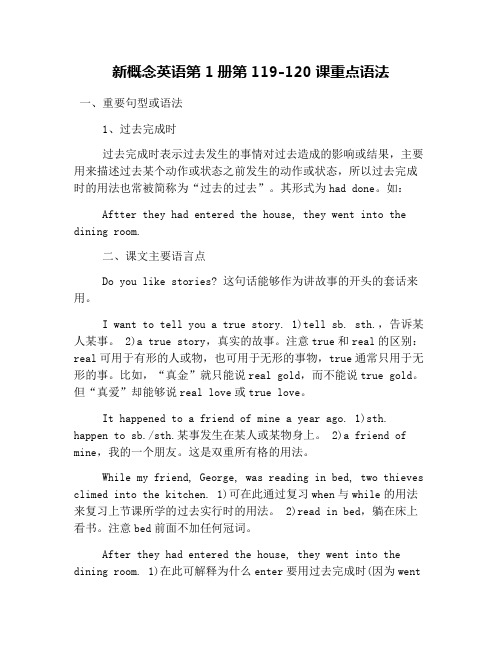
新概念英语第1册第119-120课重点语法一、重要句型或语法1、过去完成时过去完成时表示过去发生的事情对过去造成的影响或结果,主要用来描述过去某个动作或状态之前发生的动作或状态,所以过去完成时的用法也常被简称为“过去的过去”。
其形式为had done。
如:Aftter they had entered the house, they went into the dining room.二、课文主要语言点Do you like stories? 这句话能够作为讲故事的开头的套话来用。
I want to tell you a true story. 1)tell sb. sth.,告诉某人某事。
2)a true story,真实的故事。
注意true和real的区别:real可用于有形的人或物,也可用于无形的事物,true通常只用于无形的事。
比如,“真金”就只能说real gold,而不能说true gold。
但“真爱”却能够说real love或true love。
It happened to a friend of mine a year ago. 1)sth. happen to sb./sth.某事发生在某人或某物身上。
2)a friend of mine,我的一个朋友。
这是双重所有格的用法。
While my friend, George, was reading in bed, two thieves climed into the kitchen. 1)可在此通过复习when与while的用法来复习上节课所学的过去实行时的用法。
2)read in bed,躺在床上看书。
注意bed前面不加任何冠词。
After they had entered the house, they went into the dining room. 1)在此可解释为什么enter要用过去完成时(因为wentinto the dining room是发生在过去的,而enter是在此之前发生的,所以要用had entered)。
新概念第一册重点句型
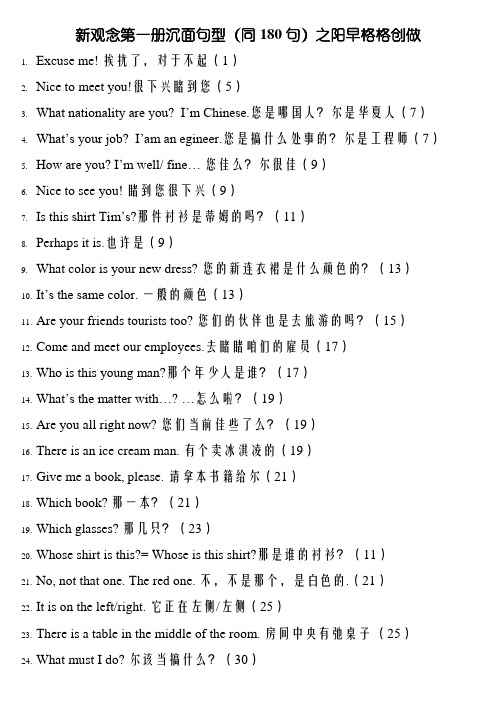
新观念第一册沉面句型(同180句)之阳早格格创做1.Excuse me! 挨扰了,对于不起(1)2.Nice to meet you!很下兴睹到您(5)3.What nationality are you? I’m Chinese.您是哪国人?尔是华夏人(7)4.What’s your job? I’am an egineer.您是搞什么处事的?尔是工程师(7)5.How are you? I’m well/ fine… 您佳么?尔很佳(9)6.Nice to see you! 睹到您很下兴(9)7.Is this shirt Tim’s?那件衬衫是蒂姆的吗?(11)8.Perhaps it is.也许是(9)9.What color is your new dress? 您的新连衣裙是什么颜色的?(13)10.It’s the same color. 一般的颜色(13)11.Are your friends tourists too? 您们的伙伴也是去旅游的吗?(15)e and meet our employees.去睹睹咱们的雇员(17)13.Who is this young man?那个年少人是谁?(17)14.What’s the matter with…? …怎么啦?(19)15.Are you all right now? 您们当前佳些了么?(19)16.There is an ice cream man. 有个卖冰淇凌的(19)17.Give me a book, please. 请拿本书籍给尔(21)18.Which book? 那一本?(21)19.Which glasses? 那几只?(23)20.Whose shirt is this?= Whose is this shirt?那是谁的衬衫?(11)21.No, not that one. The red one. 不,不是那个,是白色的.(21)22.It is on the left/right. 它正在左侧/左侧(25)23.There is a table in the middle of the room. 房间中央有弛桌子(25)24.What must I do? 尔该当搞什么?(30)25.Put these clothes in the wardrobe. 把那些衣服搁进衣柜里去(29)26.Make the bed. 整治床铺(29)27.Where is she? 她正在哪女?(31)28.What is she doing? 她正在搞嘛?(31)29.She’s sitting in the garden. 她正坐正在院子里.(31)30.What about the dog? 那么狗呢?(31)31.It’s running after a dog. 它正正在遁一只猫.(31)32.This is a photograph of our village. 那是一弛咱们城村的照片.(35)33.It’ s between two hills.它正在二座小山之间.(33)34.Some children are coming out of the building. 一些孩子正从楼里出去.(35)35.Some of them are going into the park. 他们中有几个正走进公园.(35)36.What are you going to do? 您挨算去搞什么?(37)37.What color are you going to paint it? 您挨算把它漆成什么颜色?(37)38.It’s for my daughter. 它是给尔女女的.(37)39.Pink’s my favorite color. 粉白色是尔最喜欢的颜色.(37)40.What are you going to do with it? 您挨算怎么处理它?(39)41.Don’t drop it! 别摔了!(39)42.Can you make the tea? 您会沏茶么?(43)43.Hurry up! 快面!(43)44.Can you come here a minute please? 请您去一下佳吗?(45)45.Do you want a cup? 您念要一杯吗?(47)46.Do you want any sugar? 您要些糖吗?(47)47.Do you like biscuits? 您喜欢饼搞吗?(47)48.My husband doesn’t like chicken. 尔丈妇也不喜欢鸡肉.(49)49.To tell you the truth, I don’t like chicken either. 道老真话,尔也不喜欢鸡.(49)50.Where do you come from?= Where are you from? 您从哪女去?(51)51.What’s the climate like in your country? 您们国家的气候怎么样?(51)52.What’s the weather like in spring? 秋天的天气怎么样?(51)53.Which season do you like best? 您最喜欢哪个季节?(53)54.The sun rises early and sets late. 太阳降得早而降得早.(53)55.It’s our favourite subject of conversation.它是咱们最喜欢道论的话题.(53)56.Their father takes them to school every day. 他们的女亲每天皆收他们去上教.(55)57.He arrives home late. 他到家很早.(55)58.What’s the time?=What time is it? 几面了?(58)59.Is all that? 便那些吗?(59)60.Do you want the large size or the small size? 您念要大号的仍旧小号的?(59)61.What else do you want? 您还要什么吗?(59)62.What’s the matter with him? 他怎么啦?(61)63.He feels/looks ill. 他感觉/瞅起去病了.(61)64.We must call the doctor. 您必须请医死.(61)65.He must stay in bed for a week. 他必须卧床一周.(61)66.You mustn’t get up yet. 您还不该该起床.(63)67.He must remain in bed for another two days. 他必须再卧床二天.(63)68.You must keep the room warm. 您必须脆持房间温温.(63)69.Was he absent from school last week? 他上星期上教了么?(67)70.We are going to spend three days in the country. 咱们挨算到城下去三天.(67)71.There were hundreds of people there. 许许多多的人到正在哪女.(69)72.You can see us in the crowd. 您不妨正在人群中瞅到咱们.(69)73.What’s he like? 他怎么样?(71)74.She can’t speak t o you now! 他当前不克不迭战您道话.(71)75.She does not know London very well. 她对于伦敦不认识.(73)76.She lost her way. 她迷路了.(73)77.Can you tell me the way to … 您能报告尔到…怎么走么?(73)78.Then he put his hand into his pocket and took out a phrasebook.而后他把脚伸进衣袋里掏出了一本脚册.(73)79.Can you get a pair for me? 您能为尔找一单吗?(75)80.I’m afraid that I can’t. 尔恐怕不可.(73)81.They were in fashion last year. 它们去年时兴.(75)82.Do you have an appointment? 您约佳了吗?(77)83.Is it urgent? 很慢吗?(77)84.Can’t you wait till this afternoon ? 您便不克不迭等到即日下午吗?(77)85.I’m making a shopping list. 尔正正在写买物单.(79)86.We need a lot of things this week. 那星期咱们需要很多物品.(79)87.We haven’t got much tea or coffee. 咱们的茶叶战咖啡已几了.(79)88.We haven’t got any meat at all. 咱们一面肉皆不了.(79)89.He is having a bath. 他正正在洗澡.(81)90.I’m nearly ready. 尔赶快便佳.(81)91.I’ve already had lunch. 尔已经吃过午饭了.(83)92.Excuse the mess! 屋里很治,请本谅!(83)93.I stayed at home. 尔呆正在家里.(83)94.Have you just been to the cinema? 您刚刚去过影戏院吗?(85)95.What’s on? 上映什么影戏? (85)96.Have you ever been there? 您曾去过那女吗?(85)97.It rained all the time. 向去正在下雨.(85)98.Just like London! 便像伦敦.(85)99.When did you bring it to us? 您是什么时间收去的?(87)100.Have your mechanics finished yet? 您们的板滞师建佳了吗?(87)101.Let’s go into the garage and have a look at it. 让咱们到车库去瞅一瞅吧.(87)102.They’re trying to repair it! 他们正设法建呢!(87)103.I believe that this house is for sale. 尔念那房子是要出卖吧!(89)104.How long have you lived here? 您住那多暂了?(89)105.How much does this house cost? 那座房子卖几钱?(89)106.It’s worh every penny of it. 它确真真真值那样多钱!(89)107.Has he moved to his new house yet? 他已经迁进新居了吗?(91)108.We’ll all miss him! 咱们所有人皆市念他的.(91)109.Please give him my regards. 请戴尔问候他!(91)110.He has already been to nearly every country in the world. 他去过天下上险些每一个国家.(93)111.We’ve got plenty of time. 咱们的时间很宽裕.(95)112.There is a bar next door to the station. 车站中间有一个酒吧.(95)113.We had better go back to the station. 咱们当前最佳回到车站去.(95)114.I left a suitcase on the train to London the other day. 几天前尔把一只箱记正在启往伦敦的火车了(97)115.Let me see it. 让尔瞅瞅.(97)116.This case doesn’t belong to me! 那箱子不是尔的.(97)117.What else does he say? 他还道了些什么?(101)118.I hope you are all well. 尔期视您们皆身体佳.(101)119.He doesn’t say very much, does he? 他出写很多,是吗?(101)120.简单(103)121.They were too difficult for me. 它们对于尔去道太易了.(103)122.The guy next to me wrote his name at the top of the paper. 坐正在尔中间的那部分只正在卷纸顶端写了自己的名字.(103)123.Tell her to come at once. 报告她赶快去.(105)124.I’m sorry about that. 对于此尔感触很抱愧.(105)125.Here is a little present for you. 那里有一个小礼物收给您.(105)126.Would you like to try it? 您承诺试一试吗?(107)127.I’m afraid this green dress is too small for me as well. 尔恐怕那件绿色的尔脱也太小了.(107)128.It doesn’t suit me at all. 它基础不符合尔.(107)129.I’ d like a cigarette. 尔念抽收烟.(109)130.What a pity! 真遗憾!(109)131.Eat more and smoke less! 多吃面,少抽面!(109)132.That’s very good advice. 那是极佳的提议.(109)133.It’s not as good as the expensive one. 他不价钱下的那种佳.(111)134.Can we buy it on instalments? 咱们能用分期付款的办法买买吗?(111)135.You can pay a deposit of thirty pounds, and then fourteen pounds a month for three years. 您不妨先付30英镑定金,而后每月14英镑,3年付浑.(111)136.None of our passengers can change this not. 咱们的搭客中不人能换启那弛钞票.(113)137.So have I. 尔也有(113) Neither have I. 尔也不(114)138.Everything’s very quiet. 毫无动静.(115)139.I’am sure there’s no one at home. 肯定家里不人.(115)140.They invited us to lunch. 他们邀请咱们吃午饭.(115)141.Look through the window. 从窗子往里瞅瞅.(115)e and have something to drink. 去喝面什么.(115)143.There’s none left. 一面皆不剩了.(115)144.She’s only joking ! 她不过正在启玩笑!(115)145.There were coins everywhere. 到处是硬币.(117)146.While we were having breakfast, Tommy found two small coins on the floor. 正当咱们吃早饭的时间,汤米正在天上找到了二个硬币.(117)147.It happened to a friend of mine a year ago. 那是一年前爆收正在尔的一个伙伴身上的故事.(119)148.After they had entered the house, they went into the dining room.他们进到屋里后,走进了饭厅(119)149.What’s up? 搞什么?有什么事?(119)150.The thieves dropped the torch and ran away as quickly as they could.小偷扔下脚电筒,缓慢天遁了.151.Go back to sleep. 继承睡眠吧!(119)152.I forgot to take them with me. 尔记了拿走了.(121)153.片(123)154.I must water the garden first. 尔必须先给园子浇火.(125)155.What a nuisance! 真讨厌!(125)156.I had to water it every day. 尔不克不迭不每天皆浇火.(125)157.I’ll have te a by myself. 尔一部分喝茶了.(125)158.You don’t need to water the garden. 您不必给花园浇火了.(125)159.It must be ... 那一定是 (127)160.It can’t be. 那不可能.(127)161.Let me have another look. 让尔再瞅一下.(127)162.She must be at least forty. 她一定四十多岁了.(127)163.The policeman’s waving to you. 警察正往您挥脚呢.(129)164.You must have been driving at 70 miles an hour. 您刚刚才一定是以每小时70英里的速度启车.(129)165.I can’t have been. 一定不.(129)166.We may go abroad. 咱们大概到海中去.(131)167.We can’t make up our mind. 咱们还拿大概主意.(131)168.It takes a long time. 花的时间少.(131)169.We might not go anywhere. 咱们大概哪女也不去.(131)170.I wonder why! 尔念知讲为什么!(133)171.Let me introduce him to you. 让尔把他介绍给您们.(135)172.What will you do if you win a lot of money? 假如您赢了许多钱,您挨算搞什么?(137)173.I don’t know when I will finish. 尔不知讲什么时间才搞中断.174.I was invited to a children’s party. 尔被邀请介进一个女童散会.(141)175.She was very excited, because she had never travelled on a train before 她非常激动,果为她从已坐过火车.(141)176.The lady was dressed in a blue coat. 那位妇女衣着一件蓝色的大衣.(141)177.To make myself beautiful. 为了把自己挨扮漂明.(141)178.What I saw made me very sad. 尔所睹到的十足使尔非常易过.(143)179.I went for a walk in the woods. 尔到树林里去集步.(143)180.The ground was covered with ... 天上堆谦了 (143)。
- 1、下载文档前请自行甄别文档内容的完整性,平台不提供额外的编辑、内容补充、找答案等附加服务。
- 2、"仅部分预览"的文档,不可在线预览部分如存在完整性等问题,可反馈申请退款(可完整预览的文档不适用该条件!)。
- 3、如文档侵犯您的权益,请联系客服反馈,我们会尽快为您处理(人工客服工作时间:9:00-18:30)。
新概念第一册109-120课学习目标以及重点语法、句型
Lesson 109 & 110 A good idea 好主意重点句型: 抄写重点句型并翻译成汉语:
重点语法
形容词的比较级和最高级
1、形容词的比较级和最高级规则:
①一般的形容词后面直接加er或est
②以e结尾的形容词后面直接加r或st
③以辅音字母加y结尾的形容词,把y变i,后面加er或est ④以短元音加辅音结尾的形容词,双写辅音,后面加er或est
⑤少数形容词的比较级和最高级是不规则的
⑥多音节形容词
较高比较级:more,the most
较低比较级:less,the least
判断音节:如果音标中有一个元音就是单音节;有两个元音就是双音节;有多于两个元音就是多音节。
2、形容词的比较级和最高级的用法
比较级只用于两者之间,通常与than连用。
形容词比较级之所指如果很清楚,也可以独立存在;最高级用于三者或三者以上。
形容词的最高级在使用时必须加定冠词,并常伴有一个表示范围的介词短语或从句。
long--longer(than)--longest(be+ the longest+ 表示范围的短语或从句)
This is the longest river I have ever seen.
大多数两个以上音节的形容词可与more/less连用构成其比较级形式,与most/least连用构成其最高级形式。
This model's less expensive than that one.
The other model's more expensive.
Lesson 111 & 112 The most expensive model 最昂贵的型号
重点句型: 在作业本上抄写重点句型, 并翻译成汉语:
重要语法
形容词的平级比较级:
形容词的比较形式有三种:较高比较级(more expensive,the most expensive);较低比较级(less expensive,the least expensive);平级比较级(as expensive as)。
as…as 像……一样
The green apple is as sweet as the red one.
not as…as(not so…as)不像……一样,可以用来进行比较,意思是放在前面的人或物在程度上低于后面的人或物。
I don't know as many people as you do.
It's not as good as the expensive one 它不如那种价格高的好
Lesson 113 & 114 Small change 零钱
重点句型: 在作业本上抄写重点句型, 并翻译成汉语:
重要语法
so与neither引导的简短回答
以so或neither开头的简短回答,必须用倒装形式。
肯定句:So+助动词+主语They can swim. So can I.
否定句:Neither+助动词+主语I can't help you. Neither can they.
假如前一句是肯定的,后一句就用so开头;如前一句是否定的,后一句则用neither/nor开头。
前后两句的时态要一致。
Lesson 115 & 116 Knock, knock! 敲敲门!
重点句型: 在作业本上抄写重点句型,
并翻译成汉语:
重要语法
不定代词
1、不定代词的用法
Every(每一),no(无),any(若干)及some(一些)可与one,thing构成复合代词与where构成复合副词。
①作主语:不定代词作主语都作单数看待,谓语动词一般用单数
Someone is knocking at the door. Nobody is absent. Something is wrong with my watch Everything is all right.
②作宾语
I know nothing about it. I didn't see anyone in the garden. She didn't talk to anyone at the party. She talked to nobody at the party.
③作表语
He is somebody(重要人物)in the company. I am nobody(小人物,什么也不是). But I have a dream. That's nothing. 那没什么。
2、和some,any的用法一样,somebody/someone/something/somewhere一般用于肯定句;anybody/anyone/anything/anywhere用于疑问句与否定句;nothing/nobody/no one/nowhere相当于not anything/not anybody/not anyone/not anywhere。
I went nowhere.
3、一般情况下,形容词修饰名词时,通常形容词放在名词前面,形容词修饰不定代词时,通常形容词放在不定代词之后。
a beautiful bird something good 动词不定式(to+v.)可作定语,修饰不定代词时,放在不定代词后。
something to eat
Lesson 117 & 118 Tommy's breakfast 汤米的早餐
重点句型: 在作业本上抄写重点句型, 并翻译成汉语:
重要语法——过去进行时
概念:1、在过去某个特定的时间正在进行或发生的动作。
2、当过去的一个动作发生的时候另外一个动作正在进行。
结构:主语+ was(were)+ doing eg:I was reading a book at 7 o'clock yesterday.
S+ wasn't(weren't) +Ving eg:Were you reading a book at 7 o'clock yesterday?
Was(Were)+S +Ving? eg:What were you doing at 7 o'clock yesterday?
连接时间状语从句的词:when 当……的时候;while 当……的时候(强调两个动作的同时进行)
when和while大多数情况下可互换,当强调两个动作的同时进行和发生,只能用while。
just as 正当……
时间状语从句主句放前面,用连接词连接,时间状语从句放前面时,要用逗号隔开。
I was reading a book while my wife was working in the garden at two o'clock yesterday afternoon.
While my wife was working in the garden at two o'clock yesterday afternoon.
Lesson 119 & 120 A true story 一个真实的故事
重点句型: 在作业本上抄写重点句型, 并翻译成汉语:
重要语法——过去完成时
概念:在过去某一特定的时间之前,动作已经结束或完成;过去的两个动作进行比较时,发生在之前的那个动作应该用过去完成时。
结构:S+ had 动词过去分词(+by the end of到……为止)
常与现在完成时连用的副词:already(已经),ever(曾经),for+表示时间段的词,just(刚刚),never(从未)。
I had seen 50 films by the end of last week.
I bought a new car last year after I had sold my old one.。
